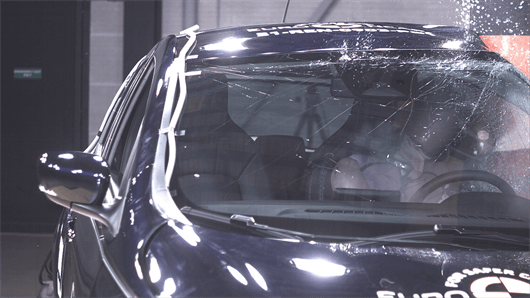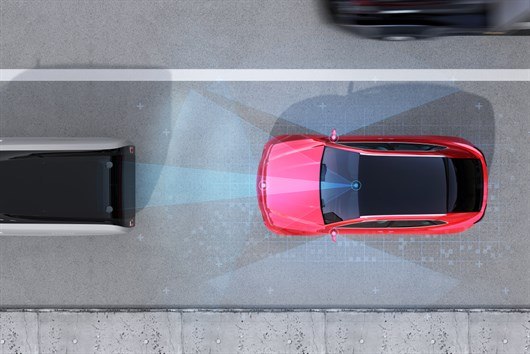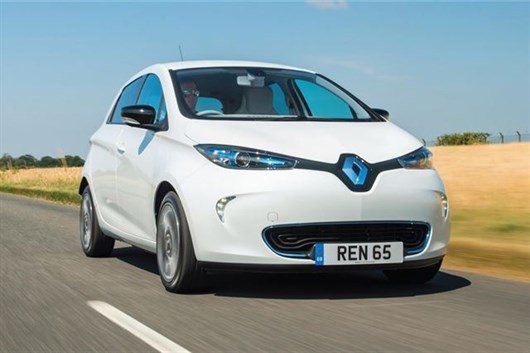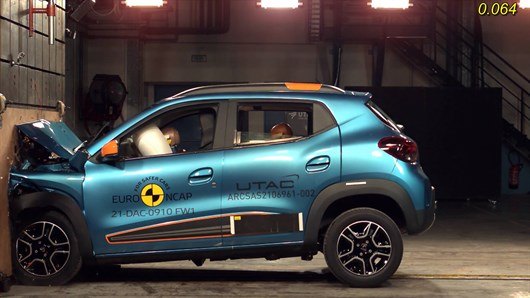Renault Zoe given zero-star rating in latest Euro NCAP test

The Renault Zoe E-Tech Electric has been given a zero-star rating in the latest round of Euro NCAP safety tests, having removed a ‘vital’ airbag, which protects against head injuries in side impacts.
It is only the third car in Euro NCAP’s history to perform so poorly, and sister brand Dacia’s new Spring electric car, which goes on sale in the UK in 2022, didn’t fare much better with just a one-star rating.
The Euro NCAP side pole test replicates real-world impacts involving a vehicle travelling sideways into rigid roadside objects such as trees or poles.
A third of these impact types are classified as fatal or serious accidents.

When the Zoe was tested the head of the crash test dummy on the driver’s side directly impacted the intruding pole.
In the frontal offset crash the results were rated as ‘poor’, due to weak protection for the chest area of the driver side dummy specifically.
Matthew Avery, Euro NCAP board member and chief research strategy officer at Thatcham Research, said: “It is a serious concern to see results like this in 2021, especially from a carmaker who has previously performed well in Euro NCAP testing.
“Renault was the first to achieve the full five-star rating in 2001, in part because it was also the first to include a combined head and thorax airbag in the Laguna 2.
“Although this was a new and revolutionary safety measure at the time, today this airbag is available on most modern cars."
"It is a serious concern to see results like this in 2021, especially from a carmaker who has previously performed well in Euro NCAP testing." Matthew Avery, Euro NCAP
He added: “Unfortunately, a conscious decision has been made to remove the head protection from this vital passive safety feature, by the brand that pioneered the use of it.
"As a result, the safety of occupants within the vehicle has been severely impacted.”
Euro NCAP said that the Zoe also lacks safety technology commonly fitted as standard in most new vehicles such as Lane Departure Warning (shown to have a lower involvement rate in fatal crashes by up to 86 per cent) and Autonomous Emergency Braking (AEB), which has been shown to reduce front-to-rear crashes with injuries by 56 per cent.
Not having these as standard resulted in the Zoe scoring 14 per cent in the Safety Assist category, 61 per cent lower than the average (75 per cent) achieved by carmakers in the same category this year.

Renault told HonestJohn.co.uk that it intends to fit AEB to every Zoe E-Tech Electric trim level as standard from March 2022.
This, in theory, could earn the Zoe one star, if it was awarded the maximum available points in the AEB car to car assessment as it would markedly improve its score in the Safety Assist category.
Commenting on the zero-star rating, a spokesperson for Renault said: “Renault takes note of the results published by EuroNCAP following specific tests on Zoe E-Tech Electric according to its new protocol implemented in 2020.
“Renault reaffirms that Zoe E-Tech Electric is a safe vehicle, which complies with all regulatory safety standards. These standards are constantly evolving and are becoming more stringent in all domains, especially in safety. Renault therefore continually improves its offer in order to comply with the regulations applicable where its vehicles are sold.

“Zoe was launched in 2013 and received five stars with EuroNCAP protocol at that time. The EuroNCAP protocol has since 2013 undergone five changes. With the same equipment, a model can lose up to two stars in each protocol change.
“The evolution of the current Zoe was decided in 2017 adapting the passive safety equipment to real accidentology and updating the car with state of the art ADAS equipment such as Advanced Emergency Braking with Pedestrian and Cyclist Detection, Lane Departure Alert and Lane Keeping Assist, using a radar and a camera."
One-star Euro NCAP rating for the Dacia Spring
The Dacia Spring, a brand-new electric vehicle in the Supermini class, performed poorly across all categories, earning it just one star.
Euro NCAP said that the dummy readings for the driver in the frontal impact test were of “particular concern”, indicating severe chest compression and little protection for the pelvis and legs.
Avery said: “The six-year-old dummy had weak protection, suggesting the forces of a crash could end in serious neck and head injuries. This is anything but a safe family car, despite being marketed as a good option for families.”
The Dacia Spring is fitted with the airbag that had been removed from the new Renault Zoe, which protects against head injury in side impacts, but key active safety systems, designed with crash-avoidance in mind, are missing.

A spokesperson for Dacia said that the Spring is “a safe new A-segment car” that complies with European safety regulations.
“Spring proposes a full list of safety features providing a better protection than most of the cars on the roads of Europe today (including those of upper segments)," the spokesperson said.
“However, the contradiction remains between the light weight/small size of the car (which makes them more efficient and more accessible) and the resistance in terms of crash. Especially with EuroNCAP protocols getting more and more stringent every two years, in particular for small city cars.
"Dacia is not chasing EuroNCAP stars that would imply fitting vehicles with features and technologies, like some ADAS (Advanced Driver Assistance Systems ), that our customers don’t want to use and/or pay today.”
Mercedes-Benz EQS gets highest Adult Occupant Protection score
The Mercedes-Benz EQS was one of the best performing vehicles this year, with 2021’s highest Adult Occupant Protection score of 96 per cent and a very strong Child Occupant Protection score of 91 per cent, earning it a five-star rating.
The Nissan Qashqai also performed well, achieving a Safety Assist rating of 95 per cent, and five stars.
The other cars which achieved five stars in this latest round of testing were the BMW iX, Genesis G70 and GV70, Skoda Fabia and the Volkswagen Cadddy.
The Fiat 500e and MG Marvel R were given four-star ratings.
What is Euro NCAP?
Euro NCAP organises crash and safety tests on new vehicles, giving motorists what it describes as "a realistic and independent assessment" of the safety performance of some of the most popular cars sold in Europe.
It was established in 1997 and is backed by several European Governments, motoring, consumer and insurance organisations.
What do Euro NCAP star ratings mean?
The number of stars reflects how well the car performs in Euro NCAP tests, with five being the maximum.
The rating is also influenced by what safety equipment the vehicle manufacturer is offering in each market.
This means that a high number of stars shows not only that the test result was good, but also that safety equipment on the tested model is readily available to all consumers in Europe.
The star rating goes beyond the legal requirements and not all new vehicles need to undergo Euro NCAP tests.
A car that just meets the minimum legal demands would not be eligible for any stars.
This also means that a car which is rated poorly is not necessarily unsafe, but it is not as safe as its competitors that were rated better, Euro NCAP says.
How often is the Euro NCAP test updated?
The five-star safety rating system is updated every two years as new innovations become available on cars.
This means that the year of test is vital for a correct interpretation of the car result.
The ratings expire after six years.
You can find the ratings for individual cars on the Euro NCAP website.

 Sarah Tooze
Sarah Tooze
 Honest John Awards 2017: Land Rover Discovery Sport named Most Popular SUV for second year in a row
Honest John Awards 2017: Land Rover Discovery Sport named Most Popular SUV for second year in a row
 2022 Smart #1 SUV: price, specs and release date
2022 Smart #1 SUV: price, specs and release date
 2023 Ferrari Purosangue SUV: Prices, specs and release date
2023 Ferrari Purosangue SUV: Prices, specs and release date
 Citroen DS3 Racing revealed
Citroen DS3 Racing revealed
 Infiniti adds diesel to the range
Infiniti adds diesel to the range
 Volvo XC90 chosen as SUV of the year at 2014 Honest John Awards
Volvo XC90 chosen as SUV of the year at 2014 Honest John Awards
 March new car registrations better than expected
March new car registrations better than expected

_COLON_no_upscale()/cdn.uk.prod.group-mobility-trader.com/images/cas/7b5b55ec3251204e8d4e65d0beb5e60c/92a9e4e4ad9c73077cca912d965d31af.jpg)
_COLON_no_upscale()/cdn.uk.prod.group-mobility-trader.com/images/fallback/coming-soon.jpg)


.jpg)






Oldboy on 10 December 2021
Continually jacking up the “Grade” requirements can be a dis-service to customers.I have a 15 year old Audi convertible and a 20 year old range rover, I doubt that either of these would score any points today and I positively do NOT want autonomous braking or “lane divergence” things which actually try to brake or steer my car without my involvement. Blinking Dangerous in my view !
Add a comment